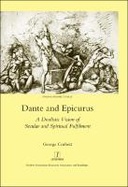Explore

"Dante and Epicurus seem poles apart. Dante, a committed Christian, depicted in the Commedia a vision of the afterlife and God's divine justice. Epicurus, a pagan philosopher, taught that the soul is mortal and that all religion is vain superstition. And yet Epicurus is, for Dante, not only the quintessential heretic but an ethical ally. The key to this apparent paradox lies in the heterodox dualism - between man's two goals of secular felicity and spiritual beatitude - at the heart of Dante's ethical, political and theological thought. Corbett's full-length treatment of Dante's reception and polemical representation of Epicurus addresses a major gap in the scholarship. Furthermore the study's focus on fault lines in Dante's vision of the afterlife- where the theological tensions implicit in his dualism surface - opens a new way to read the Commedia as a whole in dualistic terms."
This book is included in DOAB.
Why read this book? Have your say.
You must be logged in to comment.
Rights Information
Are you the author or publisher of this work? If so, you can claim it as yours by registering as an Unglue.it rights holder.Downloads
This work has been downloaded 25 times via unglue.it ebook links.
- 10 - pdf (CC BY-ND) at OAPEN Library.
- 15 - pdf (CC BY-ND) at OAPEN Library.
Keywords
- Bertran De
- Bertran De Born
- cavalcanti
- Convivio II
- Convivio Iv
- Dante’s Epicureans
- Dante’s reception
- De Vulgari Eloquentia
- Epicurean Doctrine
- Epicurean Ethics
- Frederick II
- guido
- Guido Cavalcanti
- Homo Naturalis
- Imago Pietatis
- Man’s Spiritual Journey
- Paradisus Terrestris
- Philip III
- Poco La
- Purgatorio II
- Purgatorio VI
- Russian Doll Structure
- Se Lo
- Secular Happiness
- Spiritual Hemispheres
- thema EDItEUR::D Biography, Literature and Literary studies::DS Literature: history and criticism
- Virtuous Pagans
- Voi Che
Links
DOI: 10.4324/9781351191715Editions

